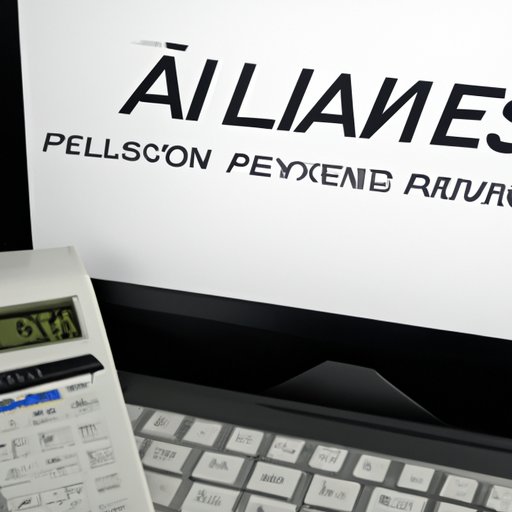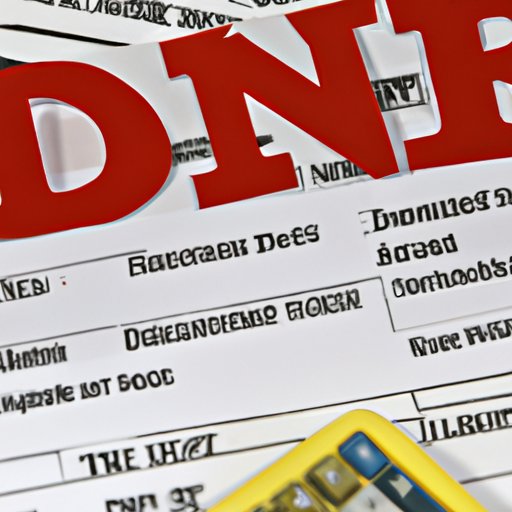Introduction
Taking control of your finances can be intimidating, but it doesn’t have to be. With the right knowledge, strategies, and tools, anyone can learn to manage their money more effectively. This article will provide an overview of key topics related to financial management and offer practical advice on how to get your finances in order.

Creating a Budget and Sticking to It
Creating a budget is an integral part of taking control of your finances. A budget is a plan that outlines your expected income and expenses over a given period of time. It helps you track where your money is going so you can make informed decisions about how to allocate it.
When making a budget, it’s important to account for both fixed and variable expenses. Fixed expenses are those that stay the same from month to month, such as rent or mortgage payments, while variable expenses can vary from month to month, such as groceries or entertainment. Once you’ve identified all of your expenses, you can calculate your total monthly spending and compare it to your total monthly income. This will help you identify areas where you may be able to cut back.
Creating a budget also has a number of benefits. It can help you stay organized, anticipate upcoming bills, and avoid unnecessary spending. It can also help you set and reach financial goals, such as saving for a down payment on a house or paying off debt. Finally, having a budget can help you feel more in control of your finances, which can reduce stress and improve your overall wellbeing.
Once you’ve created a budget, the next step is to stick to it. To do this, it’s important to track your spending and create a system for monitoring your progress. You may find it helpful to use an app or other digital tool to stay organized and motivated. It’s also important to remember that budgeting is a process and it may take some time to adjust to a new way of managing your money. If you find yourself struggling to stick to your budget, try setting smaller goals and rewarding yourself when you reach them.
Tracking Expenses and Setting Financial Goals
Tracking your expenses is an important part of taking control of your finances. Keeping an accurate record of your spending can help you identify areas where you may be overspending and better understand your financial habits. There are a number of ways to track your expenses, including using apps, spreadsheets, or even a good old-fashioned pen and paper.
In addition to tracking your expenses, it’s also important to set financial goals. Having a clear goal in mind can help motivate you to stay on track with your budget and keep working toward your long-term goals. When setting financial goals, it’s best to start small and work your way up. For example, if your goal is to save for retirement, start by setting aside a small amount each month and gradually increase it as you become more comfortable with the process.
Making a Plan to Pay Off Debt
For many people, getting out of debt is an important part of taking control of their finances. The first step is to make a plan for how you will pay off your debt. Consider different strategies, such as the snowball method (paying off the smallest balances first) or the avalanche method (paying off the highest interest rate balances first). Once you’ve decided on a strategy, make a list of all your debts and prioritize them according to your chosen plan.
It’s also important to stay motivated when tackling debt. Celebrate small wins, such as paying off a credit card balance or reaching a milestone, and reward yourself for your hard work. Remind yourself why you’re doing this and focus on the end goal. Finally, don’t be afraid to ask for help if you need it. Consider talking to a financial advisor or joining a support group to stay on track.

Automating Payments for Bills and Savings
Automating your payments is another great way to take control of your finances. Automating your bill payments can help ensure that you never miss a payment, while automating your savings can help you reach your financial goals more quickly. Many banks and other financial institutions offer online tools to help you set up automatic payments.
There are several benefits to automating your payments. It can save you time and effort since you won’t have to manually enter information every month. It can also help you avoid late fees and other penalties. Finally, automating your payments can help you stay organized and motivated to reach your financial goals.
Finding Ways to Reduce Monthly Expenses
Reducing your monthly expenses is another key part of taking control of your finances. Start by reviewing your budget and identifying areas where you can cut back. Common areas for cost savings include grocery shopping, entertainment, transportation, and utilities. Additionally, look for ways to save money on recurring expenses, such as switching to a cheaper cell phone plan or bundling services.
It’s also important to think creatively about ways to save money. Consider bartering for goods or services, buying used items, and taking advantage of discounts and coupons. Finally, try to resist the temptation to buy things you don’t need. Ask yourself if the item is worth the cost and wait at least 24 hours before making a purchase.

Saving Money by Using Cash Instead of Credit
Using cash instead of credit is another great way to save money. Paying with cash can help you stay within your budget and avoid racking up debt. It also makes it easier to track your spending since you’ll know exactly how much money you have left in your wallet or purse.
When using cash, it’s important to be mindful of how you spend it. Make sure to set aside money for bills and other necessary expenses before spending on discretionary items. It’s also a good idea to divide your cash into envelopes for different categories, such as groceries or entertainment. This can help you stay on track and avoid overspending.

Taking Advantage of Tax Breaks and Deductions
Finally, it’s important to take advantage of tax breaks and deductions when filing your taxes. These can help you save money and reduce your taxable income. Common tax deductions include student loan interest, medical expenses, charitable donations, and home office expenses. Additionally, some states offer additional tax breaks for certain activities, such as donating to charities or investing in green energy.
It’s also important to review your taxes each year to make sure you’re claiming all of the deductions you qualify for. Consider talking to a tax professional if you have any questions or need help understanding the process.
Conclusion
Taking control of your finances can seem daunting, but it doesn’t have to be. By creating a budget, tracking expenses, setting financial goals, and taking advantage of tax breaks and deductions, you can be well on your way to financial freedom.
(Note: Is this article not meeting your expectations? Do you have knowledge or insights to share? Unlock new opportunities and expand your reach by joining our authors team. Click Registration to join us and share your expertise with our readers.)
